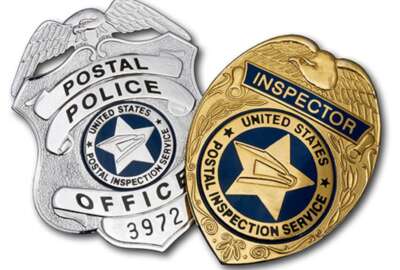Hubbard Radio Washington DC, LLC. All rights reserved. This website is not intended for users located within the European Economic Area.
This law enforcement sting operation netted a thousand arrests
Imagine an operation in which 10,000 law enforcement people worldwide arrested a thousand violent organized criminals. That is what happened in 2021, in an oper...
Imagine an operation in which 10,000 law enforcement people worldwide arrested a thousand violent organized criminals. That is what happened in 2021, in an operation known as Trojan Shield. A Justice Department team led the effort. Team leaders have won this year’s Service to America Medal for safety, security and international affairs. The Federal Drive with Tom Temin talked with one of them: Assistant U.S. Attorney Josh Mellor.
Interview Transcript:
Tom Temin And my first question is, how could you possibly corral 10,000 people in law enforcement worldwide to bear on this? What kind of effort did that take?
Josh Mellor Yeah, so there was a lot of coordination. We had built up relationships over about 18 months, two years. And yeah, try to get 10 versus 10,000 people involved was really kind of a huge effort. But that involved weeks and weeks of coordination and making sure that everybody understood the strategy, the timeline and the goals of the investigation.
Tom Temin Okay. And let’s get to the investigation itself. Operation Trojan Shield, that could be a lot of things. What was the goal here and what was the whole effort all about?
Josh Mellor The goal of the investigation was to collect evidence against criminal users, drug traffickers, money launderers people involved in violent acts or organized criminal groups. It was to collect evidence to use against them, to prosecute them for their crimes.
Tom Temin Was this primarily in the Western Hemisphere and the nations that we commonly think of in South America and Central America as the source for a lot of this cartel type people?
Josh Mellor So a lot of the users were in Australia, New Zealand, South America and Europe. Those are the primary users who were in those countries.
Tom Temin So really all over the world, in other words.
Josh Mellor Yes, it is a worldwide operation.
Tom Temin But these types of things happen all the time. There’s illegal drugs, there’s illegal human trafficking, and on and on. What about Trojan Shield? What was the unifying principle here? Why these thousand among probably 10,000 you could have arrested?
Josh Mellor Yeah. These individuals were usually the distributors, the leaders, individuals that were committing the most violence. And so those were the individuals that were focused on the United States and then also on other countries that we work with.
Tom Temin And I want to ask about the security, both of the data and of the fact of the operation going on and the fact that not every nation has the same approach to corruption and bribery as the United States does ideally. How did you keep that all under control with, again, multiple nations and multiple bureaus and law enforcement agencies?
Josh Mellor That was one of the more challenging aspects of investigation, because we knew that to be successful in this operation, we had to share information, we had to share data. So we started out with just a few countries that the United States had very strong relationships with and then branched out from there. But towards the end, we just had to kind of take that leap of faith and work with countries that may not have the same commitment to public safety and to derailing public corruption. But in the end, we knew that we had to share data in order to be successful.
Tom Temin And the arrests then took place in multiple nations eventually.
Josh Mellor Yeah. So the big takedown, which was called Joint Action Day, was on June 7, 2021. It involved over 10,000 law enforcement officers throughout the world, Australia, New Zealand and Europe.
Tom Temin In the investigation stage. How did that work? Was it primarily database work or did you have a combination of data, types of techniques and also people, you know, human intelligence and snitches and so forth, informants on the street?
Josh Mellor Yeah. So each country, it works a little bit different, but there were contacts for human sources that were involved throughout the operation. And you had other individuals or data driven, but we were obtaining information on a regular basis on drug shipments, on violent acts, on other criminal endeavors that were taking place. And so, you know, depending on the situation, obviously a violent act, we had to minimize any threat for life and then drug seizures. We had to analyze the data and make the seizure if we needed to.
Tom Temin We’re speaking with Josh Mellor. He is assistant U.S. attorney for the Southern District of California. And along with two people from the FBI, a winner of this year’s Service to America Medal for Safety, Security, and International Affairs. And just tell us about some of the assets from the United States. I mean, there were at least two big units of the Justice Department involved. What kind of deployment did it take from just U.S. assets.
Josh Mellor So primarily, it was the Department of Justice, the U.S. attorney’s office for the Southern District of California and the Federal Bureau of Investigation, San Diego branch. And while there’s myself and others, several other U.S. attorneys that were involved. And then you had the primary case agents, but you had over 100 FBI agents that came from other parts of the United States come in to assist with reviewing messages. Analyzing messages and putting out information in a place in a format to be understood and shared with our foreign partners.
Tom Temin And to what extent does the U.S. Attorney function then inform the FBI as to what kind of evidence will be needed that eventually you can use and hold up in court when you do the prosecution piece after the FBI has gathered the evidence and maybe conducted the arrests or assisted in them.
Josh Mellor So we work hand in hand with the FBI. A We consider ourselves to be partners. And so every step of the way from the beginning of the investigation to the end of the investigation, we’re working together. We’re meeting, we’re collaborating and discussing those issues throughout the investigation. So it’s not words. At the end, we meet and discuss what type of evidence we need collaborating and partners throughout the entire investigation.
Tom Temin And what about injuries, deaths, shootings? I mean, did people come through it pretty much safely, at least on the good guys side?
Josh Mellor So in law enforcement, there weren’t any casualties. There weren’t any unforeseen incidences. And one of the great things about the investigation and being able to share information with foreign partners and foreign authorities is they’ll prevent those violent acts from occurring, whether it’s kidnappings, murders, or other violent acts, be able to prevent those throughout the investigation. In total, we prevented about 150 murders from being completed.
Tom Temin And some of the techniques are pretty interesting that you use to gather information. It almost sounds like Better Call Saul or something, but you managed to get phones that were secretly sending you the information on those phones, the conversations. But the criminals thought they were just burner phones. Correct. How’d that work?
Josh Mellor Yeah. So this market existed before the FBI entered the space and this application actually existed beforehand. It’s just that the Australian Federal Police, the FBI, using a confidential human source, were able to exploit that application and to be able to collect the data which criminals thought was encrypted in reality was being sent to the FBI Monday, Wednesday, and Friday.
Tom Temin So in many ways, the criminals indicted and convicted themselves.
Josh Mellor They actually in our indictment, there are influencers, they would tout the application and say it was super secure, that not even the FBI could crack it. So they were promoting this product to other criminal organizations. And from there, this was organically spread throughout the world.
Tom Temin And so there was a wiretapping, so to speak, for lack of a better word. It wasn’t wires, wireless tapping.
Josh Mellor We worked with a foreign partner that was located in the European Union to obtain the data. So, yeah, no, no, no, no actual wiretapping. But we work with a foreign government to obtain the data.
Tom Temin And during your time overseeing this, was that pretty much a full time job for you? I mean, there’s a lot going on in Southern California.
Josh Mellor Yeah. No. Besides the good weather and surfing. Yeah. No, we work 24 hours a day sometimes because, you know, with all the different foreign parties we’re working with and the time changes. So we had a lot of early morning phone calls, really late phone calls. And especially as we got toward Joint Action Day, this was more than a full time job and, you know, a lot of traveling. One of the things that I think kind of gets missed is that this happened all through COVID. And so you can just imagine this type of operation happening in the height of COVID and being able to travel, to be able to have lots of people in a room to view and analyze and share data was by itself a huge undertaking.
Tom Temin And do you think you could, pardon the expression, get away with it again, that same technique now that this was been so widely covered over the years, a lot of articles have been written about this. Could you get those types of secretly supplied phones into the hands of, say, the cartel people or, you know, the fentanyl people and so on?
Josh Mellor Yeah, I mean, so this was, you know, the stars align, so it’s unlikely we can replicate it in the same fashion. But, you know, there’s a bunch of creative agents, prosecutors that are all kind of working towards, you know, how to combat crime. And one of the goals of this investigation is to show criminal organizations that we weren’t afraid to get into space. And, you know, they should think twice before they pick up another phone that they think is encrypted.
Tom Temin And I imagine from those arrests, the prosecutions are still going on. What’s the status of the cases? How many have resulted in convictions and what’s going on there?
Josh Mellor Yeah, it’s obviously specific cases I can’t talk about, but there have been prosecutions throughout the world, a lot in Australia and a lot of in Europe and other prosecutions. So there’s prosecutions in the United States, that are ongoing and obviously can’t talk about those. But there have been prosecutions kind of throughout the world over the last two years.
Tom Temin But you have gotten some convictions also.
Josh Mellor Yeah, especially in Europe. There’s been a lot of convictions and some pretty significant sentences that have been handed out.
Tom Temin All right. Well, these things take time. Sometimes it’s years till you get someone actually permanently behind bars, fair to say.
Josh Mellor Yeah. Now, these prosecutions can take a long period of time.
Copyright © 2024 Federal News Network. All rights reserved. This website is not intended for users located within the European Economic Area.
Tom Temin
Tom Temin is host of the Federal Drive and has been providing insight on federal technology and management issues for more than 30 years.
Follow @tteminWFED





